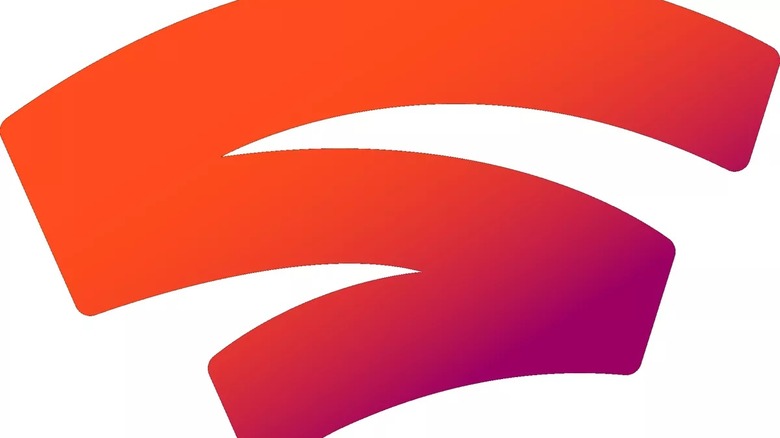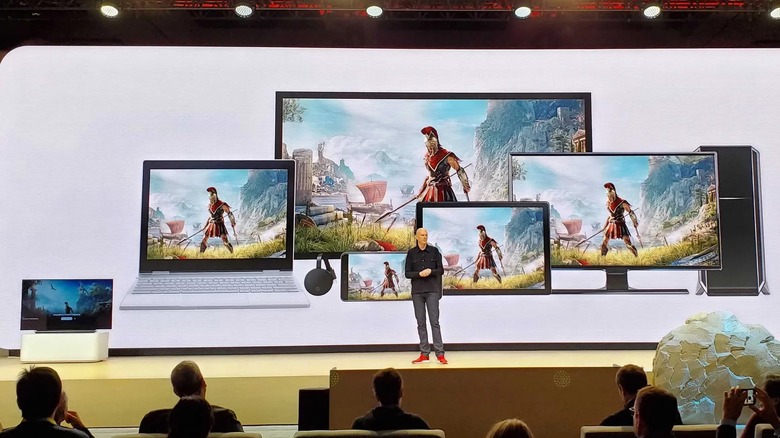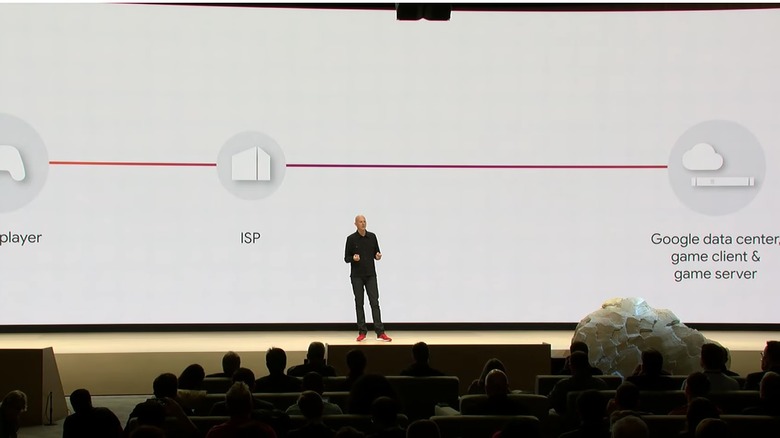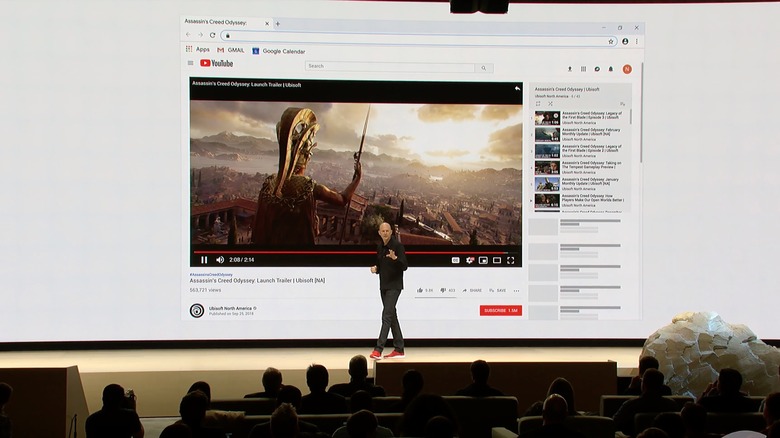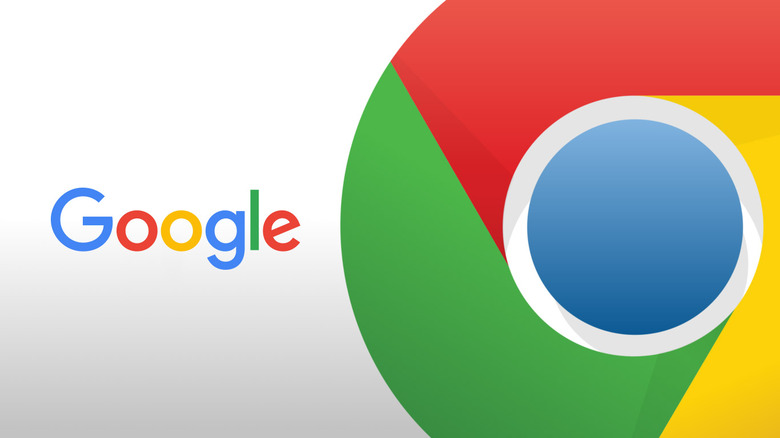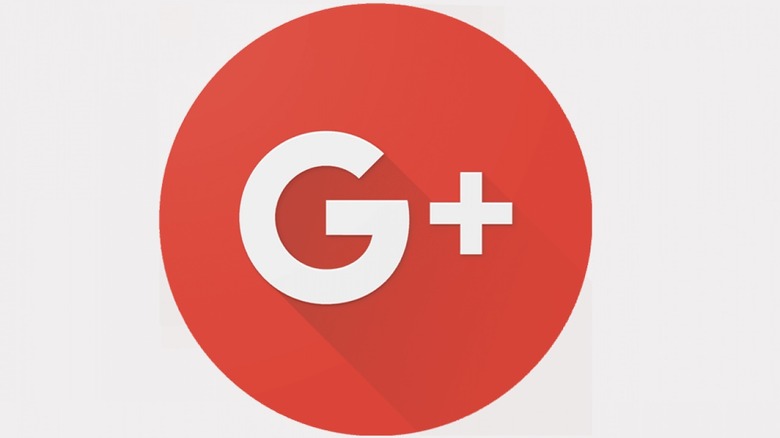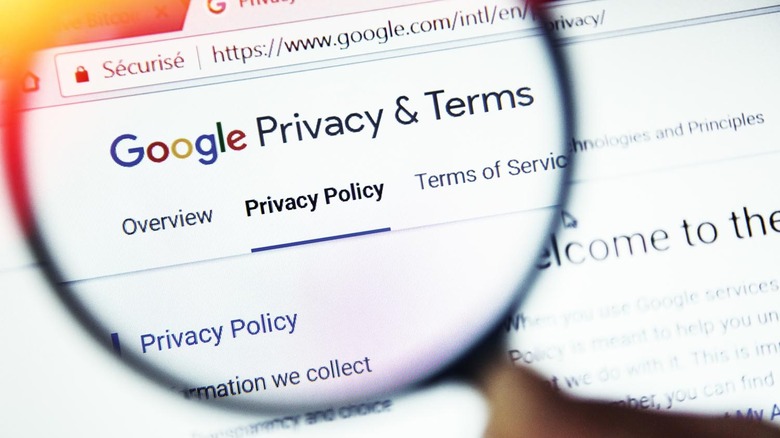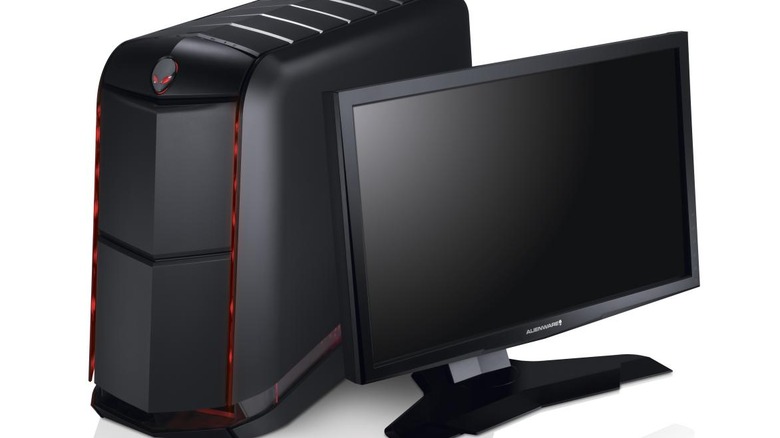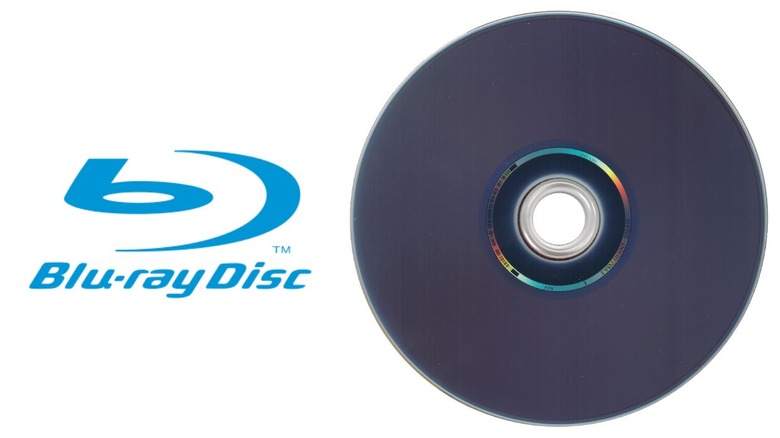The Biggest Unanswered Questions About Google's Stadia
Well, it's officially happening: Google, possibly most influential corporation on the planet, has finally set its eyes on the world of gaming with a streaming program called Stadia. No consoles, no hookups, no downloads: all it needs is you, a controller, an internet connection, and a piece of software with Google's name attached to it. They're not exactly in over their heads here; it's not like they're the first major corporation to just out-of-the-blue decide to make games. Ask Sony circa 1993 and Microsoft circa 1999 about that. But Google has possibly the most baggage and the biggest hurdles to overcome, especially considering they're going to try it with technology that doesn't really have the best track record of success.
As such, while we got some details from Stadia's coming out party at the 2019 Game Developer's Conference, there's still quite a few outstanding questions that will absolutely need answering before anybody should get too excited about the future of cloud gaming under the all-seeing eye of Google.
How much will it cost?
Probably the biggest and most immediate question of them all. Google offered no clue as to what they expect customers to pay for the privilege of accessing Stadia, and so much of the potential hype around the thing depends on Google getting this just right.
For posterity's sake, the closest current comparison to be drawn to Stadia is Sony's PlayStation Now streaming service, which lets anyone with a PC or Sony-branded device stream around 800 of their games for $20 a month. It's got many of the same pitfalls as Stadia, but it does give access to Sony exclusive titles and, better yet, the ability to download PS4 titles for offline use. The Xbox Game Pass is cheaper at $10 a month and has a stronger selection of current games, but, of course, you need an Xbox One for that.
So, more than likely, the sweet spot for Google is right in the middle, at $14.99 a month. If they can deliver on all their other promises, and address the other concerns, Google might just have a future in this biz at that price. Might.
What's it like at lower speeds?
During their presentation, Google boasted proudly of being able to deliver 4K/60fps gameplay through Stadia, which is probably very much a possibility provided you live in, say, New York or San Francisco, where the internet flows like wine. If you live in, say, Kansas or Oklahoma, or places like Australia and New Zealand with notoriously unreliable internet, what's Stadia going to be able to pull off for you?
According to Kotaku's interview with Phil Harrison, 25Mbps is enough to at least get you to 1080p. Meanwhile, the average internet speed in the US? 19Mbps. Now granted, it's definitely getting better. But that doesn't change the fact that 3Mbps is very much reality for a chunk of the country, and as the former head of a company that got famously and viciously dragged for suggesting the infrastructure was ready for always-online gaming, Harrison should be well aware of the danger here.
Where are the games?
As much as there's skepticism floating around about Stadia, Google would've probably walked from their conference scot-free had they shown off a killer gaming lineup or even just a list of third parties who've jumped onboard. What we got was Assassin's Creed: Odyssey, Rise of the Tomb Raider, and the promise that Doom Eternal would be coming to the service. Apparently, some of the graphics shown prior to the presentation suggest Metal Gear and Red Dead Redemption might be in the cards, but none of that's been confirmed.
Thing is, with the exception of Doom Eternal, all of those games have been out for months, and the players that want them will have already had them for closer to a year by the time Stadia rolls out. Announcing Red Dead would've even been nice, since that series isn't available on PC. Instead, right now, Google's selling a platform to gamers that doesn't have any new games. That's a problem Google will hopefully fix by the time E3 rolls around.
How badly is this going to destroy Chrome?
Stadia will be available to virtually any device that supports Google Chrome, including mobile phones. That's excellent news until you remember just how much of a resource devouring monster Chrome usually is, and that's just from plain old vanilla browsing.
Of course, it won't be as bad as trying to run these games from Steam or uPlay or what have you, since Google's servers will be doing the heavy lifting, processing-wise. But even just having one-too-many YouTube videos open at once can shoot that system usage meter up into the red real fast on a less-than-capable computer. On mobile, the same goes for trying to open Google Assistant when more than one app is open on anything that's not a brand spanking new device, though one presumes there'll be a dedicated Stadia app for this exact reason. It all boils down to whether Google's stated goal of letting everyone be able to play regardless of hardware is possible if folks might still have to upgrade their low-end hardware.
Can Google be trusted?
As this article was being written, Google announced that they will be shutting down their Inbox app. The official sunset date is on April 2, 2019, which is the same date that Google+ will be going away to join the crowded technological graveyard of abandoned Google services like Google Buzz, Glass, Helpouts, Notebook, Picasa, Orkut, and Dodgeball. The list gets longer when you factor in services Google pumped money into, then just decided to buy up the competition, like what happened when Google had a streaming video service, went "Meh," and just bought YouTube instead.
For what it's worth, having industry titans like Phil Harrison and Jade Raymond onboard with Stadia does inspire confidence that Google's not just messing around here. And clearly, the technology itself is a major investment that those other services didn't get. That's still a not-great track record Google's working off of here, and considering the last high-profile attempt at cloud-based gaming was OnLive, which also died quickly and horribly, it's hard not to have concerns over whether Google's gonna be able to stick with this for the long haul.
No, really, can Google be trusted?
There's another facet of the trust factor, though: the idea of the many-limbed corporate kraken that is Google injecting itself into yet another facet of online life. This goes way beyond the Google Play Store; this is a situation where Google controls the service, the software, and the preferred peripheral, and every action taken with any of the above goes through them.
We can probably expect to hear the minutiae about how Google plans to protect personal info and data the closer we get to the service's launch, but one of the major advantages Google's ecosystem has over, say, Apple is that you have a lot more flexibility in terms of who gets what information and how. Think about how Google's algorithms influence what you see recommended on YouTube, and imagine Google holding a Steam-like platform where you try to find new games. Google having that level of control over what you see and play comes with concerns.
What can they offer casual gamers?
As it stands right now, if you want to play the best FPSs, or action games, you go pick up an Xbox or a PC. If you want to be able to break the game and mod it into something else, you game on PC. If you're looking for Mario, Zelda, and the best curated collection of indie games on the planet, you get a Switch. The types of players who want something more casual already have mobile phones, and there's no shortage of free time wasters that don't require a controller of any kind.
So, if Google's stated mission is to make video games more accessible, and the relatively cheap ubiquity of video game consoles and gaming-quality PCs hasn't been enough to entice them, what is Google planning to offer to attract the audience whose needs are already being met? Considering we've only seen three very huge AAA titles shown running through Stadia, one gets the feeling they're going to have to pull something truly unique out of the hat to stand out.
What will this mean for PC gamers?
On the other end of the spectrum are PC gamers. Google has a little more of an in here. The perpetual fear of every PC gamer is buying a game that, despite meeting the recommended specs, runs like trash on your computer. With Stadia, all the processing's being done on Google's end. There's a downside, though. For starters, while the specter of DRM casts an ugly shadow over the idea that PC gamers actually own the games they buy, that specter becomes an all-encompassing Demogorgon when dealing with a service where you're basically borrowing the game with no option to even touch it unless you're online. Plenty of gamers won't mind, of course, but smart gamers live in perpetual fear of a P.T. situation where suddenly a publisher decides to take their ball and go home.
The second issue isn't as dire but is arguably just as important, which is that mods are out of the question. Granted, this means the rampant cheating that makes online multiplayer on PC an utter hellscape will be gone, but it also means the end for far more innocuous tweaks. If all PC gamers wanted to do was play the game as is, they'd buy consoles. Stadia may very well force them that direction unless Google has a solution.
How will Google protect the streamer generation?
One of the objectively cool features Google is crowing about is the ability for streamers to open up gaming sessions to viewers who want to jump in. That could create some great interactions in the future. It could also create a complete nightmare for them.
As it is, streamers face an immense amount of fresh hell from their own fans, rival streamer fans, and just plain trolls. Imagine being a female streamer who has an open session in their game, and suddenly, their stalker, under a fake name, gets to harass them in-game at the push of a button. Or imagine a professional streamer having their game disrupted by a rampant griefer. It's already bad enough to just have to read the abuse coming from the chat box side of Twitch. Imagine giving them immediate interactive access. Before playing up the feature, Google's next showcase for it better include a look at its security settings, or the ugly side of streaming will get a lot uglier.
Is this the death knell of physical media?
It's no secret that big tech companies would love nothing more than to put a stake through physical media's heart once and for all. The war for music is long done, aside from the small but fervent vinyl contingent. Film is fighting a losing battle, with most experts conceding 4K UHD is probably the last physical format. Gaming is next, and even though Microsoft tried to kickstart the apocalypse before the world was ready, digital sales are already starting to eclipse physical.
If Stadia is successful, though, things will likely kick into high gear in a hurry. That's not necessarily a good thing for the reasons mentioned before about PC gaming. Console players revolted fast and hard over the idea of not being able to own their own games back in 2013, but that problem gets a hell of a lot worse in an ecosystem where you can't even get to your games unless you talk to Google first, and their whims are fickle. In addition, game preservation and archival efforts — which are young fields of study to begin with — are already being stymied by problems bridging the gap between corporate interests and historical/artistic ones, where the original physical copies are often the last vestige of a game that exists. Digital remains untrustworthy in that regard, and it's frightening to think of Google, like Valve, as the steward of gaming history.

